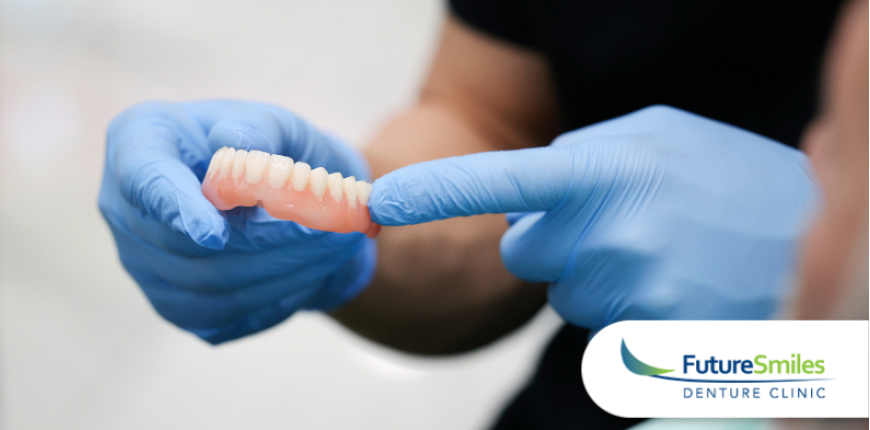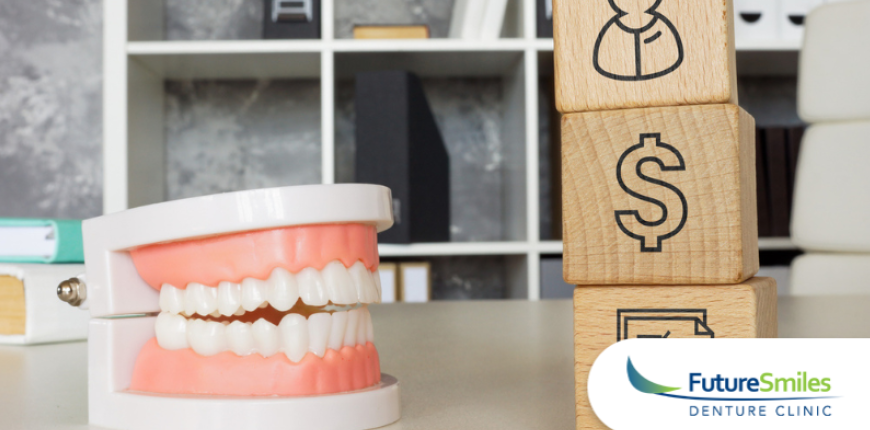Good Habits For Great Oral Health
Clean Your Mouth
Whether you have few teeth to brush or none, you still have to take care of your mouth and clean it with the right products. If you have some natural teeth remaining, make sure you brush and floss twice a day and if you have no natural teeth, brush your mouth with a soft-bristled brush. Make sure to brush your gums, tongue, and inside of the cheeks twice a day to remove plaque and stimulate oral tissue circulation. Swishing with mouthwash or warm salt water is also a good way to remove plaque and bacteria from the mouth and gums.
Let Your Gums Breathe
Take your dentures out before you go to bed every night and soak them in warm water. This allows your gums a chance to breathe and prevents bacteria from growing under the dentures. Removable dentures, whether they are complete dentures or partial dentures, should not be worn for more than 24 consecutive hours.
Drink Water
Drinking water helps to rinse food particles and bacteria out of your mouth. To improve your overall oral health, try to drink water often but particularly after eating, to help cleanse your mouth. Drinking water can also help to clear away any particles that may get caught between the dentures and the gums and cause discomfort.
Eat Well
When all of your natural teeth are gone you may think that sugar will not affect your oral health as much since there are no teeth to get cavities. In reality, sugar facilitates bacteria growth that damages the gums. Processed sugar also is not good for your overall health, which plays a role in your oral health. Instead of sugary foods, try to eat a healthy, balanced diet with lots of vegetables and fruits and a variety of vitamins and nutrients.
Quit Smoking
Smoking is terrible for your oral health, whether you have natural teeth or not. While lung cancer is often associated with smoking, there are actually many forms of mouth, and throat cancer that you are at increased risk of when you smoke, including cancer of the tongue, cheek, larynx (voice box), and esophagus. These are only the oral cancers you are at high risk of. Quitting smoking is no easy feat, so try to build a support group of friends and family and speak with other people who have quit. Tell any other friends you smoke with to not ask you to smoke with them and/or to not smoke around you. Even if you’ve been smoking for the majority of your life, quitting at any age has been shown to improve your quality of life.
Visit Your Denturist
Scheduling regular check-ups with your denturist allows for the detection of any potential gum infection or disease. Discuss your oral cleaning habits and denture care with your denturist while at your appointment and ensure you are on track for a healthy, comfortable mouth.
Visit A Calgary Denturist
Take control of your oral health and schedule an appointment with a Calgary denturist. Whether you wear complete dentures or partial dentures, your oral health is of the utmost priority. Make sure you’re speaking and eating as comfortably as possible and that you are setting yourself up to continue to do so for years to come. At Future Smiles Denture Clinic, our staff is dedicated to educating our patients on denture care and oral health care. When you visit our denturist, you will receive advice on your oral habits so you can have the healthiest smile possible. To speak with the team at Future Smiles Denture Clinic in Calgary, you can visit the SW Calgary Denture clinic on Macleod or the NE Calgary location in Coral Springs. To book a free consultation with our Calgary Denturist, call 1-403-475-0016 or fill out the online contact form.
FAQ
Q: Can I brush my complete dentures?
A: While you should be brushing your dentures often, you should be doing it with a soft-bristled brush and denture solution, not toothpaste. Dentures are more delicate than natural teeth and can be damaged by whitening toothpaste.
Q: I’m looking for affordable denture solutions. What options do I have?
A: At Future Smiles Dentures Clinic, we know that Calgarians are looking for low-cost, stress-free denture payment plans. This is why we offer affordable denture solutions, including direct billing and financing.
Q: What are some of the signs of gum disease?
A: Periodontal disease, called gingivitis in its early stages, is a result of infection and inflammation of the gums and jaw. Some people may require complete dentures as a result of periodontal disease. Some signs of these diseases are:
- Bad breath
- Swollen, red, tender gums
- Bleeding gums
- Painful chewing
- Sensitivity or loosening of any natural teeth
- Gums pulling away from any natural teeth
- Change in the bite or fit of the denture







